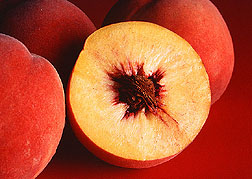This page has been archived and is being provided for reference purposes only. The page is no longer being updated, and therefore, links on the page may be invalid.
|
|
Can Soil Microbes Rescue Strawberries and Peaches from Disease?By Marcia WoodMarch 12, 1997 Scientists are looking for a few good microbes to patrol the soil in strawberry fields and fruit orchards. Natural bacteria would help plants resist diseases such as black root rot, or a condition known as replant disorder. The search is a joint effort of scientists with USDA's Agricultural Research Service, at Fresno, Calif., and a commercial firm, Gustafson, Inc., in McKinney, Texas. If the scientists succeed, growers may be able to reduce reliance on chemicals such as methyl bromide needed to kill disease organisms in the soil. Black root rot occurs when certain soil fungi attack the roots of strawberry plants. It's one reason why strawberry growers fumigate fields with methyl bromide before planting. Growers of peaches and other stone fruits fumigate to prevent another problem--replant disorder. It occurs when peach or other stone fruit trees are removed, and the "replacement" trees don't thrive. Some strains of rhizobacteria--soil-dwelling microbes--are known to secrete compounds that bolster disease resistance and increase plant growth. But no one knows exactly how the compounds do this. Under a cooperative research and development agreement, ARS researchers will evaluate microbes provided by Gustafson. They want to discover which rhizobacteria strains might be the best soil allies of strawberries or stone fruits. Top-performing strains may become candidates for commercial development by Gustafson. Research elsewhere has shown that the test strains promote growth of some vegetable crops. The idea of using rhizobacteria to protect crops is not new. But rhizobacteria that would do this job for strawberries or stone fruits have not been commercialized. Scientific contact: Cynthia G. Eayre, USDA-ARS Horticultural Crops Research Laboratory, Fresno, Calif., phone (209) 453-3162, ceayre@asrr.arsusda.gov |


